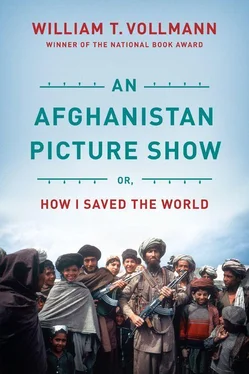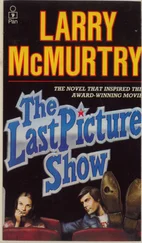STATEMENT OF JAMIAT-I–ISLAMI MUJAHIDEEN COMMANDER
“What weapons do you most need?”
“Anti-aircraft guns. And if we get anti-air missiles, you will see what a lesson we can give the Soviet invaders!”
“How is the food situation in your part of Afghanistan?”
“Very bad.”
“What will you do if you cannot get what you need?”
“Why, perhaps we will kill ourselves, but we will certainly never surrender.”
* A manual for soldiers of the British Empire, with such helpful pattern sentences as “Silence!” or “Bring me at once five hundred coolies,” or “You are now under Government rule.” One of the most humiliating things that happened to me on this journey occurred when I was still on the plane and I proudly told the man in the seat beside me that I had studied some Pushtu, and he said something that I could not understand, and I said, “What?” and he said, “I asked you how your Pushtu was.”
† The General told me that ammunition was hard to get, and when it was in good supply, the Peshawar-based organizations distributed it stingily, so as to keep the individual bands from becoming too independent. So it was like everything else. If their parties helped them too much they hurt themselves. So Commissioner Abdullah had thought, not wanting to give vocational training to the refugees because that took work away from Pakistanis, so he left them as beggars, as a burden. So our C.I.A. might have thought — why should they be in a hurry for this embarrassment to the Soviets to come to an end? So the Young Man undoubtedly thought; otherwise he would have given away all his money and let them feed upon his flesh.
‡ Five.
§ Probably they didn’t.
‖ Why should I give the enemy anything?
a In April 1987, I read with great pleasure that Pakistan had shot down a plane of the “Afghan” Air Force over this terrain, not far, said the paper, from Parachinar. The plane had violated Pakistani airspace a day or two after two other bombings by “Afghan” planes which had killed about a hundred people.
b “Then we have the problem of the journalists going inside Afghanistan. Even if they can smuggle [themselves] out the Pakistan checkpoints, it is difficult for them to walk for several days and weeks in the mountain terrain of the country. Moreover, danger awaits them in every step they take. Very few exceptional journalists can work under such conditions. Most of those who go inside limit their trips to areas near the border and write superficial reports.” — Mirror of Jehad: The Voice of the Afghan Mujahideen (Jamiat-i-Islami publication), January — February 1982.
c This portion of Poor Man’s statement was translated by a different person than the other, which explains the syntactical differences. For more information on the use of C.B.W. agents in Afghanistan, see the Haig Report cited in the Sources section at the end of this book.
d Philosophical Investigations , IIxi, p. 223e.
e And here I see the slide of the boy who stood on a high green Afghan hillside, pointing at the sun the wooden toy gun that his father had carved for him (had he already crossed the river also, so young?), and his little sister’s hair was falling out in patches from some disease but she wore a necklace of heavy squares of pure silver carved with signs, gladdened with jewels or colored glass beads (how would I ever know which?).
f Airplane.
g Small sweet apricot.
h This may sound like propaganda. It is not. Never have I seen people so serene, yet so full of a great considered purpose.
i The Qur’an in fact states that sick people, travelers and warriors on jihad may break their fast and make it up later. Suleiman, therefore, would have been triply justified in taking the medicine.
j Mr. William is an unbeliever, not a Muslim.
Hail Red Army in Afghanistan! Down with Islamic reaction! No to the veil! Extend gains of October Revolution to the Afghan peoples!
SPARTACIST CAMPAIGN LEAFLET, U.S.A.
On the train
At the end of his voyage he took the Khyber Mail back to Karachi — second class this time, for financial reasons (cost: about Rs. 103). It brought back to mind his nightmares of the Karachi railway station, City and Cantt — the wild-eyed woman holding out a hand and bringing it slowly to her mouth, then stretching it out again, saying, “Give me only for food — only for food!”; the soft, persistent “Hello, mister? Hello? Hey, mister!” gradually increasing in volume as the Young Man walked past until it became a desperate shout, the faces of the red-uniformed coolies contorting with rage when he clung to his pack, and always people staring, staring at him, moving in like flies if he so much as slackened his step, old men bellowing offers of hotels and rides and hashish, filthy kids standing there with waiting palms, and all of them crying out to him to help them, until for frustration he could have killed them.
The Khyber Mail, anyhow, was packed even worse than usual, it being the Eid holiday at the close of Ramazan. Second class was just wooden benches. Men slept braced between seat tops and the luggage rack, the rest of their bodies entirely in space; or piled on the floor, pushing at each other in their sleep. To go to the latrine you had to step on heads or fingers. (There was no toilet paper; the doorknob was slippery with shit.) If you were lucky enough to be sitting on a bench, two or three heads were heavy against your ankles like cannonballs; someone else casually slung his legs up on your shoulders; a third had his head on your thigh — and stretched full-length on the bench was another sleeper, anyhow, so that everyone else on it, including you, had to sit an inch from the edge. When the Young Man couldn’t stand it anymore he got down on the floor with the others. A man pressed up against him fiercely in sleep, pushing him at a slant against the faces of other sleepers. He slept for half an hour. Then finally when he couldn’t stand it anymore there, either, he sat up on the floor. Above him, in the little space where he had been sitting, was a stack of feet originating from all directions — five or six pairs of feet, each on top of the others.
An acquaintance invited him into an upper berth. He accepted with alacrity, for there were little army-green fans up there, on the ceiling. He discovered immediately, however, that they did nothing. When he put his hand right against the grille he could barely feel any disturbance in the air.
“Are you married?” his companion asked shyly.
“Soon,” he said.
This evidently excited the fellow, for the Young Man felt his hand poking slyly in his ribs. It was 3:00 a.m. He reached out to push the hand away and found it to be the foot of another aerial slumberer.
The instant he had gotten on the train (the General’s son Zahid had driven him to the station and found his coach for him), sweat began to run down his face, as with everyone else’s, so humid with bodies it was in there. During the two nights of the journey it only got worse. Every time the train stopped, the fans stopped and the lights faded to red-eyed bulbs. It was an express train, so, unlike the Yugoslavian trains of that appellation, it didn’t stop at every single station — it stopped at every station but two. He got desperately thirsty. Few pleasures of beauty or love, or any other, are as wonderful as the satisfaction of thirst; few needs are more tormenting. At those midnight stops, sometimes he’d see (in the larger towns of the Punjab) a man presiding like a bartender over Fanta and Coca-Cola, the bottles not even cold the way they were in the daytime when musclebound old men with sad faces walked up and down the trains, carrying buckets filled with drinks in ice and crying — “ Bottali! Bottali! Soda! Yaukh!” *( “bottali” sounding to him like beetles or insects) — no, now there was just the filthy, hazy, soggy night as they trundled on and on through the farmland province, and the man seated behind the counter with his bottles would refuse to come to the train window — and there was no predicting how long they might stay at any one station — fifteen minutes? half a minute? — so climbing out the window was very risky and he never did it.
Читать дальше












